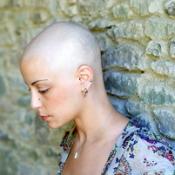 The day I had been waiting for had arrived. I’d finished cancer treatment and could move on with my life after nearly a year of difficult treatments. I remember the feeling of elation that followed me after that last day of radiation treatment. I finally felt free. My husband and I took a trip to Hawaii to celebrate, and I felt more alive than maybe ever in my life. It was like I’d been holding my breath for months and now I finally was able to exhale. I’d finally been released from the physical and emotional confinements of cancer treatment.
The day I had been waiting for had arrived. I’d finished cancer treatment and could move on with my life after nearly a year of difficult treatments. I remember the feeling of elation that followed me after that last day of radiation treatment. I finally felt free. My husband and I took a trip to Hawaii to celebrate, and I felt more alive than maybe ever in my life. It was like I’d been holding my breath for months and now I finally was able to exhale. I’d finally been released from the physical and emotional confinements of cancer treatment.
When I returned from my Hawaiian “cancer-cation,” I found that things were already changing from the way they had been during treatment. There were no more supportive cards arriving in the mail, email check-ins from friends started to dry up, and the fruit baskets stopped arriving. Then the calls offering support started to dry up. Medical appointments became less frequent. Support systems began to fade. And then came the feelings—big, dark, troubling feelings. I found myself thinking, “I could have died; I still could die!” and the recognition that I would be living in the shadow of cancer for the rest of my life began to emerge.
Soon it was time to return to work, and I began to feel the weight of expectations from friends, family, and coworkers. I was done with treatment, and everyone wanted me to return to life as normal. Everyone was expecting it. But I knew I was forever changed and there would be no going back to “the old me.” I began to feel the pull of depression and anxiety, as well as the need to make meaning of my cancer experience. I began to wonder if it was a good time to reach out for help.
Does this experience resonate with you? It seems to be a common theme among cancer survivors I have worked with. In fact, it’s an experience so common and almost universal to people who have had cancer that many cancer hospitals and treatment facilities are now taking action toward creating survivorship programs that address the ongoing mental health needs of their patients. There is a reason they call the period after cancer “the new normal.” It’s an acknowledgment that the old, precancer life is gone and that we have to make our way to finding a new life for ourselves.
Why do so many of us who have experienced cancer face depression and anxiety post-treatment? Getting a cancer diagnosis is one of the most shocking and frightening experiences a person can face. It is, for many people, a traumatic experience. Even for those who don’t feel traumatized by it, it’s a moment that is seared into our minds forever and something we will never forget.
Immediately after diagnosis, we go through an overwhelming period where we struggle to manage our fears and grasp exactly what we will be facing in our treatment. We often have to make quick decisions about treatment options in a very short period of time. There is little time to process all the fear and trepidation we feel. Then treatment begins and we focus on getting through it. We stuff down our emotions and connect with the warrior part of ourselves. And then treatment ends and emotions that were buried as part of self-protection begin to resurface. The intensity of the feelings we experience can catch us totally off guard.
We may experience anxiety and depression. For many, the end of treatment only marks the beginning of a whole new set of challenges to be faced: how to manage the anxiety and fears of recurrence. How to find meaning in an old life that no longer fits. How to process the enormity of what you’ve been through. You may be feeling as I did—lost and rudderless in a your new, post-cancer identity.
You may be wondering how to get your life back on track after cancer. I wish I could provide you with some kind of a map to guide you, or a spreadsheet detailing exactly what to expect in your emotional and physical recovery. The reality is that just as each of us has a unique cancer diagnosis and treatment experience, each of us will have a different experience in how we process our experience with cancer.
Some will need extra time to recover physically and to reconnect with and forgive a body that betrayed them. Some will want to explore a newfound sense of meaning that they found in their cancer experience. Others may need help in implementing a plan to finally start to put their health and self-care into priority. Some may connect to all of this and more.
If any of this resonates with you, you’ll likely find that connecting with a supportive therapist who understands the issues unique to people with cancer will be helpful to you. The kind of emotional exploration done in therapy will arm you with tools for coping with the depth of emotion you feel and allow you to get back on the path to living in your new, post-cancer identity.

The preceding article was solely written by the author named above. Any views and opinions expressed are not necessarily shared by GoodTherapy.org. Questions or concerns about the preceding article can be directed to the author or posted as a comment below.

 Helping Teens to Cope with Your Cancer
Helping Teens to Cope with Your Cancer Living with Cancer: Grieving Your Losses Along the Way
Living with Cancer: Grieving Your Losses Along the Way Coping with Fear of Cancer Recurrence
Coping with Fear of Cancer Recurrence

